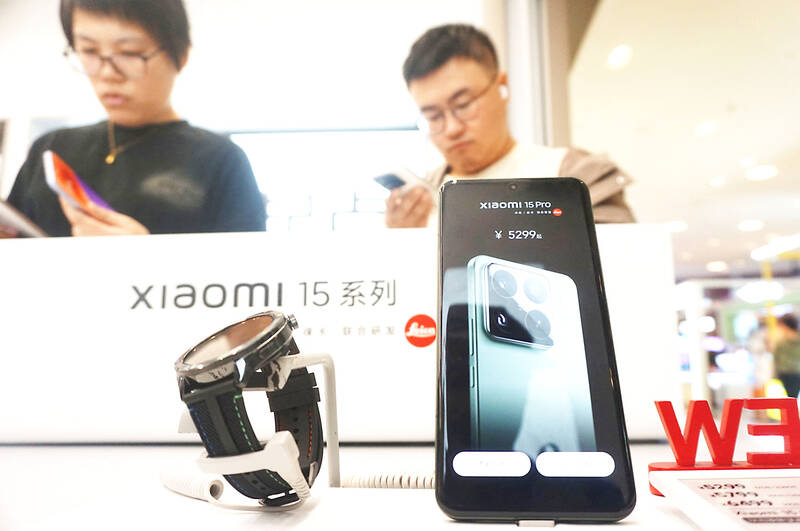Xiaomi Corp (小米) is preparing a self-designed mobile processor for its upcoming smartphones in an effort to reduce its reliance on foreign suppliers Qualcomm Inc and MediaTek Inc (聯發科).
The processor might help Xiaomi be more self-sufficient and stand out in an Android market led by Qualcomm customers.
Mass production of the chip designed in-house is expected to begin next year, people familiar with the matter said.

Photo: AFP
The timeframe underscores how Xiaomi is keen to join a growing number of tech majors investing in semiconductors, a key focus for Beijing in a broader tech race with the US.
For the Beijing-based company, it marks a foray into yet another cutting-edge field in a year in which Xiaomi also invested heavily in electric vehicles (EVs).
Developing in-house chipmaking expertise can help the company’s efforts toward making smarter and better-connected EVs, above and beyond more competitive mobile devices.
A Xiaomi spokesperson did not respond to requests for comment.
Xiaomi’s nascent semiconductor work could pose a challenge for the chip manufacturer it contracts this production to, as industry leader Taiwan Semiconductor Manufacturing Co (台積電) faces escalating pressure from US authorities to curtail its business with customers from China.
The Chinese smartphone maker, which counts Qualcomm as an early investor, works closely with its US partner, and has generally been content to optimize the main processor and augment it with power management and graphics enhancements.
Xiaomi will invest about 30 billion yuan (US$4.1 billion) in research and development next year, up from 24 billion yuan this year, chairman and chief executive officer Lei Jun (雷軍) said last month.
The research will focus on core technologies such as artificial intelligence, operating system improvements and chips, Lei said.

When an apartment comes up for rent in Germany’s big cities, hundreds of prospective tenants often queue down the street to view it, but the acute shortage of affordable housing is getting scant attention ahead of today’s snap general election. “Housing is one of the main problems for people, but nobody talks about it, nobody takes it seriously,” said Andreas Ibel, president of Build Europe, an association representing housing developers. Migration and the sluggish economy top the list of voters’ concerns, but analysts say housing policy fails to break through as returns on investment take time to register, making the

‘SILVER LINING’: Although the news caused TSMC to fall on the local market, an analyst said that as tariffs are not set to go into effect until April, there is still time for negotiations US President Donald Trump on Tuesday said that he would likely impose tariffs on semiconductor, automobile and pharmaceutical imports of about 25 percent, with an announcement coming as soon as April 2 in a move that would represent a dramatic widening of the US leader’s trade war. “I probably will tell you that on April 2, but it’ll be in the neighborhood of 25 percent,” Trump told reporters at his Mar-a-Lago club when asked about his plan for auto tariffs. Asked about similar levies on pharmaceutical drugs and semiconductors, the president said that “it’ll be 25 percent and higher, and it’ll

CHIP BOOM: Revenue for the semiconductor industry is set to reach US$1 trillion by 2032, opening up opportunities for the chip pacakging and testing company, it said ASE Technology Holding Co (日月光投控), the world’s largest provider of outsourced semiconductor assembly and test (OSAT) services, yesterday launched a new advanced manufacturing facility in Penang, Malaysia, aiming to meet growing demand for emerging technologies such as generative artificial intelligence (AI) applications. The US$300 million facility is a critical step in expanding ASE’s global footprint, offering an alternative for customers from the US, Europe, Japan, South Korea and China to assemble and test chips outside of Taiwan amid efforts to diversify supply chains. The plant, the company’s fifth in Malaysia, is part of a strategic expansion plan that would more than triple

Taiwanese artificial intelligence (AI) server makers are expected to make major investments in Texas in May after US President Donald Trump’s first 100 days in office and amid his rising tariff threats, Taiwan Electrical and Electronic Manufacturers’ Association (TEEMA, 台灣電子電機公會) chairman Richard Lee (李詩欽) said yesterday. The association led a delegation of seven AI server manufacturers to Washington, as well as the US states of California, Texas and New Mexico, to discuss land and tax issues, as Taiwanese firms speed up their production plans in the US with many of them seeing Texas as their top option for investment, Lee said. The